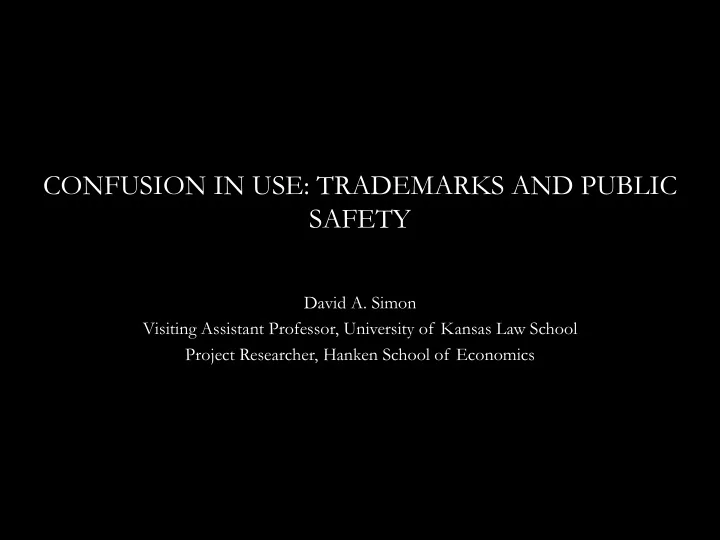

CONFUSION IN USE: TRADEMARKS AND PUBLIC SAFETY David A. Simon Visiting Assistant Professor, University of Kansas Law School Project Researcher, Hanken School of Economics
The Argument • Existing law: Trademark law will lower the standard of confusion when the risk of physical harm exists. • Proposal: Trademark law should lower the standard of deception when the risk of physical harm exists. • dietary supplements
4 Stories 1. The Physician and the Pharmacist (or nurse, tech, etc.) 2. The Old Man and the Louse Powder 3. The Supplement and the Prescription 4. The Suggestive Supplement
#1 The Physician & The Pharmacist Presamine OR Premarin
#2 The Old Man & The Louse Powder
What then? • Infringement: trademarks result in “likelihood consumer confusion”; confusion as to source • But no consumer confusion in 2 stories • Rule: When trademark confusion may result in the use of the wrong product and that use risks physical harm, prohibit the use • By reducing standard of liability • Shift consumer • Lower sophistication • Rationale: trademark confusion that results in risk of physical harm should be prohibited
#3: The Supplement and the Prescription AND/OR HERBROZAC
#4 The Deceptive Supplement
What now? • The Supplement and the Prescription • initial interest in a product because of name • Liability? • Rule: confusion in use, enjoin • Rationale: confusion risks physical harm • The Deceptive Supplement • No confusion • Maybe initial interest in one case • Deception in Others – can we extend rationale? • dietary supplements
Argument, revisited • Rule & Rationale from stories #1, #2, & #3 • e x t e n d to dietary marks that • describe, suggest, imply, product will cause certain physiological effects • How? • Using a doctrine built-into trademark law . . . • deception
Deceptive Marks • Deceptive and Deceptively Misdecriptive • Test “(1) Is the term misdescriptive of the character, quality, function, composition or use of the goods? (2) If so, are prospective purchasers likely to believe that the misdescription actually describes the goods? (3) If so, is the misdescription likely to affect a significant portion of the relevant consumers’ decision to purchase? In re Budge Mfg. Co., Inc., 857 F.2d 773, 775 (Fed. Cir. 1988); TMEP 1203.02(c).
Proposals • When the name of a dietary supplement • suggests, implies, or describes physiological effects consumer might expect the supplement to produce • Lower the standard for deception • Bar from protection
Deceptive Marks • Deceptive, full stop • Conclusively presume likely to affect purchasing decisions • Bar from registration as deceptive • Bar from protection as deceptive? • Rationale: if risk of physical harm, bar use • Benefits • Increase public safety • Force companies to use non-misleading trademarks • Better-informed consumers • Increase product quality
Problems • First Amendment • Protection issues • Need?
Federal Trade Commission • FTC enforce as deceptive • FTC petition to cancel mark? • Benefits • already doing some of this work • repeat player • statutory authority
Sales Pitch • Increase Public Safety • Low cost • No legal change required • Greatest effect where greatest harm can occur
davidsimon@ku.edu
Recommend
More recommend